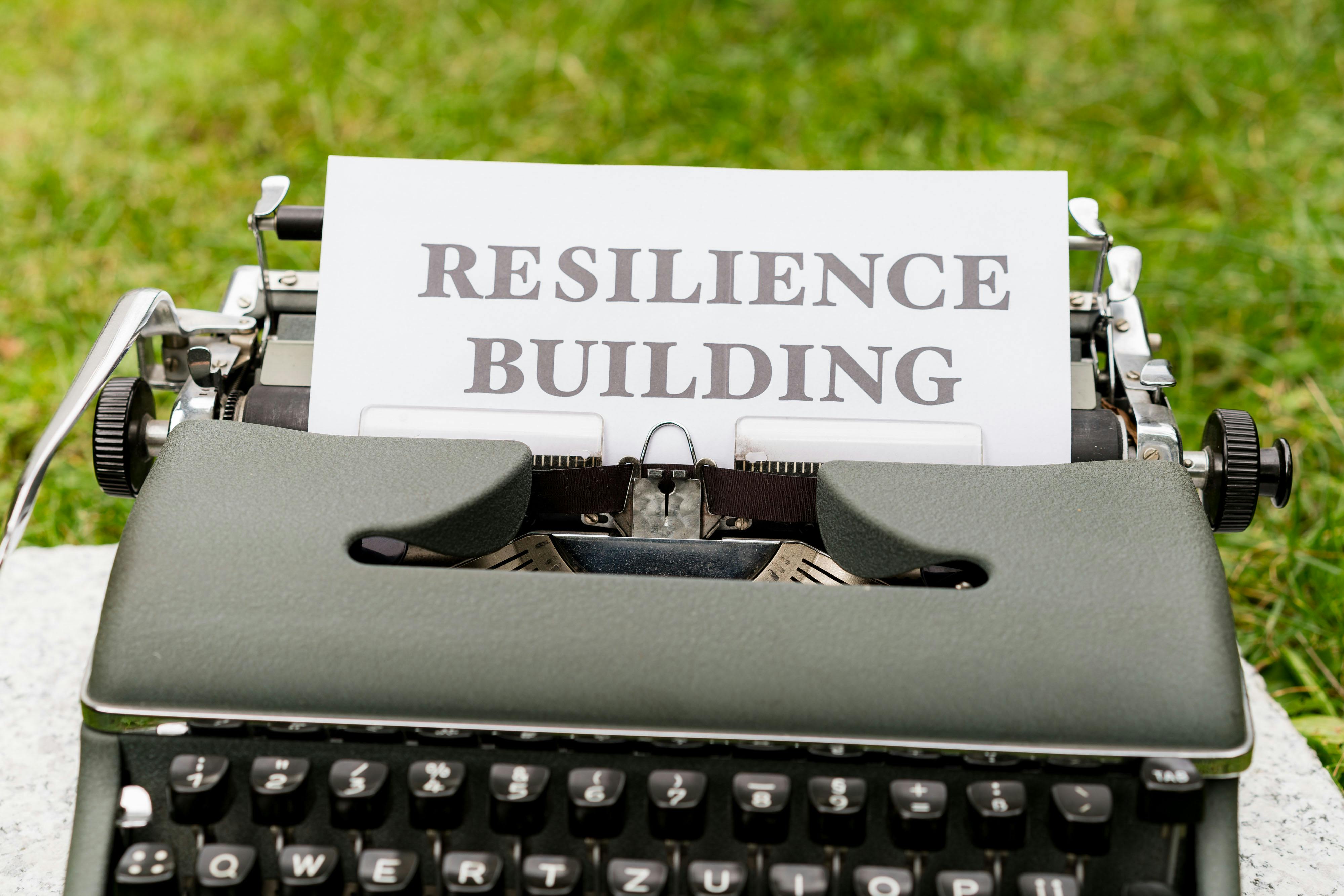In this article, you will discover effective ways to build resilience when confronted with change. Life is full of unexpected twists and turns, and being able to adapt and bounce back is crucial for personal growth and success. Whether it’s a major life transition, career change, or even smaller daily challenges, developing resilience can help you navigate uncertain times with ease and confidence. By embracing certain strategies and mindset shifts, you can learn to thrive in the face of change and emerge stronger than ever before.

- Understanding the concept of resilience
- Defining resilience
- Importance of resilience in the face of change
- Recognizing the need for change
- Accepting change as a natural part of life
- Understanding the triggers for change
- Building a positive mindset
- Cultivating an optimistic outlook
- Practicing gratitude and mindfulness
- Developing emotional intelligence
- Recognizing and understanding emotions
- Managing emotions effectively
- Building a support network
- Identifying and nurturing relationships
- Seeking support from friends, family, or mentors
- Setting and pursuing goals
- Setting realistic and achievable goals
- Developing a plan of action
- Cultivating adaptability
- Embracing flexibility and open-mindedness
- Developing problem-solving skills
- Practicing self-care
- Prioritizing physical well-being
- Engaging in activities that bring joy or relaxation
- Learning from setbacks
- Accepting failure as an opportunity to learn
- Analyzing setbacks and adapting strategies
- Maintaining perspective
- Focusing on the bigger picture
- Finding meaning and purpose in change
Understanding the concept of resilience
Resilience is a term that describes the ability to bounce back and adapt in the face of adversity or change. It is the capacity to recover quickly and effectively from difficult situations. Resilience is not something we are born with, but rather a skill that can be learned and developed over time. It involves having a positive mindset, emotional intelligence, a support network, goal-setting, adaptability, self-care, and the ability to learn from setbacks. By understanding and incorporating these elements into our lives, we can enhance our resilience and navigate through life’s challenges with strength and grace.
Defining resilience
Resilience can be defined as the ability to face and overcome adversity and bounce back from difficult experiences. It is the capacity to maintain a sense of well-being and thrive even in the midst of challenging circumstances. Resilience involves having a strong foundation of coping mechanisms and strategies that enable individuals to navigate through difficulties and come out on the other side stronger than before.
Importance of resilience in the face of change
Change is an inevitable part of life. From career transitions and personal relationships to unexpected events and global crises, change is constantly occurring around us. In order to navigate these changes effectively, resilience is crucial. It helps build our capacity to adapt, remain focused, and remain positive during times of uncertainty and upheaval. Resilience allows us to maintain a sense of control over our own lives, even in the face of external circumstances beyond our control. By developing resilience, we empower ourselves to not only survive change but to thrive and grow in the process.
Recognizing the need for change
Change often brings about feelings of discomfort and resistance. Our natural inclination is to resist change and cling to familiarity, even if it no longer serves us. However, recognizing the need for change is essential in our personal and professional growth. By acknowledging that change is necessary, we open ourselves up to new opportunities, experiences, and possibilities. We begin to see change not as something to be feared, but as an opportunity for growth and self-improvement.
Accepting change as a natural part of life
Change is an essential and natural part of life. Just as flowers bloom and seasons change, our lives are also subject to constant transformation. Accepting change as an inherent part of life can help us embrace it with more resilience and ease. Instead of resisting, we can learn to go with the flow, adjust our expectations, and be open to new possibilities. Change allows us to evolve and grow, ultimately leading to personal development and fulfillment.
Understanding the triggers for change
Change can be triggered by various factors, both external and internal. External triggers may include events like losing a job, starting a new relationship, or relocating to a new place. Internal triggers, on the other hand, stem from personal growth, reflection, and the desire for self-improvement. By understanding the triggers for change, we can better prepare ourselves mentally and emotionally to handle the challenges that come with it. This awareness allows us to approach change from a place of understanding and readiness.
Building a positive mindset
A positive mindset is a crucial component of resilience. It involves framing challenges as opportunities for growth, maintaining a hopeful outlook, and cultivating optimism even in the face of adversity. By adopting a positive mindset, we can shift our focus from what is going wrong to what is going right. This shift in perspective helps us develop a resilient mindset that can withstand the ups and downs of life.
Cultivating an optimistic outlook
Optimism is a powerful tool in developing resilience. It allows us to look for the silver lining in difficult situations and maintain hope for a better future. Cultivating an optimistic outlook involves reframing negative thoughts into positive ones, practicing gratitude, and focusing on the good in our lives. By choosing to see the glass as half full rather than half empty, we can build resilience and face challenges with a sense of hope and possibility.

Practicing gratitude and mindfulness
Gratitude and mindfulness are practices that can greatly enhance resilience. Practicing gratitude involves acknowledging and appreciating the positive aspects of our lives, no matter how small. By focusing on what we are thankful for, we cultivate a sense of contentment and abundance, which in turn helps us build resilience. Mindfulness, on the other hand, involves being fully present in the moment, without judgment or attachment. It allows us to observe our thoughts and emotions without getting caught up in them, thus increasing our ability to respond to challenges with resilience and clarity.
Developing emotional intelligence
Emotional intelligence is the ability to recognize, understand, and manage our own emotions, as well as the emotions of others. It plays a vital role in developing resilience, as it enables us to navigate through difficult situations with empathy and composure. By honing our emotional intelligence, we become better equipped to regulate our emotions, handle stress, and maintain healthy relationships.
Recognizing and understanding emotions
The first step in developing emotional intelligence is to recognize and understand our own emotions. This involves becoming aware of our emotional triggers, identifying patterns in our emotional responses, and acknowledging our feelings without judgment. By developing self-awareness, we can better navigate through emotional ups and downs and respond to challenges with resilience and grace.
Managing emotions effectively
Once we have a better understanding of our emotions, the next step is to learn how to manage them effectively. This involves practicing emotional regulation techniques such as deep breathing, meditation, and journaling. By learning to regulate our emotions, we can respond to challenges in a calm and rational manner, making it easier to bounce back from difficult situations.

Building a support network
Building a strong support network is an essential factor in developing resilience. Having a network of supportive relationships not only provides emotional support but also allows us to gain different perspectives and insights. A support network can consist of friends, family, mentors, or support groups. By nurturing these relationships and seeking support when needed, we can strengthen our resilience and navigate through challenges with the help of others.
Identifying and nurturing relationships
Identifying and nurturing relationships that provide support and encouragement is crucial for resilience. It involves surrounding ourselves with people who uplift us, believe in us, and provide a safe space for us to express ourselves. These relationships can serve as a source of strength and encouragement during difficult times, helping us maintain a positive mindset and bounce back from setbacks.
Seeking support from friends, family, or mentors
In times of change and adversity, it is important to reach out to our support network for guidance and assistance. Whether it’s seeking advice from a trusted friend, seeking comfort from a family member, or getting mentorship from a trusted mentor, reaching out for support helps us build resilience. By sharing our experiences and seeking advice from those we trust, we can navigate through challenges more effectively and come out stronger on the other side.
Setting and pursuing goals
Setting and pursuing goals is a powerful way to develop resilience. Goals provide a sense of direction, purpose, and motivation in our lives. By setting realistic and achievable goals, we can focus our energy on what we can control and work towards overcoming challenges. Goals also help us develop a plan of action, keeping us motivated and on track when faced with setbacks.

Setting realistic and achievable goals
When setting goals, it is important to be realistic and ensure they are achievable. Setting unrealistic goals can lead to disappointment and a sense of failure, undermining our resilience. By setting achievable goals, we set ourselves up for success and build confidence in our abilities. Small, incremental goals can serve as building blocks towards larger goals, ultimately leading to personal growth and resilience.
Developing a plan of action
Once goals are set, it is important to develop a plan of action to achieve them. This involves breaking down larger goals into smaller, manageable tasks, setting deadlines, and allocating resources and time effectively. With a clear plan in place, we can navigate change and setbacks with resilience, adjusting our strategies as needed while staying focused on the ultimate goal.
Cultivating adaptability
Adaptability is a key characteristic of resilience. It involves being flexible and open-minded, willing to adjust and embrace change when necessary. Cultivating adaptability allows us to navigate through uncertainty and unexpected challenges with resilience and grace.
Embracing flexibility and open-mindedness
In order to develop resilience, it is important to embrace flexibility and open-mindedness. This means being open to new ideas, perspectives, and possibilities. By letting go of rigid thinking and embracing change, we can adapt more easily to new situations and bounce back from setbacks. Cultivating a mindset of flexibility and open-mindedness allows us to navigate through challenges with resilience and find creative solutions to problems.
Developing problem-solving skills
Developing problem-solving skills is crucial in building resilience. Problem-solving skills involve the ability to identify and analyze problems, generate and evaluate possible solutions, and implement effective strategies. By developing these skills, we become better equipped to handle unexpected challenges and find solutions that promote resilience. Problem-solving skills also help us think critically, make informed decisions, and approach change with confidence.
Practicing self-care
Self-care is an essential aspect of resilience. It involves prioritizing our physical, mental, and emotional well-being and engaging in activities that bring joy and relaxation into our lives. By taking care of ourselves, we replenish our energy, reduce stress, and build resilience to face challenges head-on.
Prioritizing physical well-being
Taking care of our physical well-being is a fundamental pillar of resilience. This involves getting enough sleep, eating nutritious foods, and engaging in regular physical exercise. Prioritizing physical well-being helps us maintain optimal health, increase our energy levels, and strengthen our resilience to cope with change and challenges.
Engaging in activities that bring joy or relaxation
Engaging in activities that bring joy or relaxation is an important part of self-care and resilience. This could be pursuing hobbies, spending time in nature, practicing mindfulness, or engaging in creative outlets. By engaging in activities that bring us joy and relaxation, we recharge our energy and boost our resilience, allowing us to face challenges with a renewed sense of vitality and strength.
Learning from setbacks
Setbacks are inevitable in life, but they can also serve as valuable learning opportunities. Instead of viewing setbacks as failures, we can choose to see them as opportunities to learn, grow, and refine our strategies. By accepting failure as a natural part of the learning process, we build resilience and develop the ability to bounce back from setbacks with greater determination and wisdom.
Accepting failure as an opportunity to learn
Failure is not the end but rather a stepping stone towards success. By accepting failure as an opportunity to learn, we embrace resilience. Reflecting on our mistakes and analyzing what went wrong allows us to adapt our strategies and improve our approaches. Every setback becomes a chance to gain valuable insight and develop resilience for future challenges.
Analyzing setbacks and adapting strategies
When faced with a setback, it is important to take the time to analyze what went wrong and adapt our strategies accordingly. This involves reflecting on the situation, identifying the factors that contributed to the setback, and adjusting our approach. By learning from setbacks and adapting our strategies, we strengthen our resilience and increase our chances of success in the future.
Maintaining perspective
Maintaining perspective is crucial in developing resilience. It involves stepping back and seeing the bigger picture, rather than getting lost in the details or overwhelmed by challenges. By maintaining perspective, we can gain a sense of clarity and understanding that helps us navigate change with resilience and grace.
Focusing on the bigger picture
When faced with challenges, it is easy to get caught up in the immediate difficulties and lose sight of the bigger picture. By focusing on the bigger picture, we remind ourselves of our values, goals, and aspirations. This broader perspective allows us to see beyond the current obstacles and maintain resilience, knowing that the challenges we face are part of a greater journey towards personal growth and fulfillment.
Finding meaning and purpose in change
Change can often disrupt our sense of meaning and purpose in life. However, by actively seeking out and finding meaning in change, we can develop resilience. This involves reflecting on the lessons and opportunities that change brings, as well as aligning our actions with our values. By finding meaning and purpose in change, we can navigate through challenges with a sense of direction and resilience, knowing that every experience serves a purpose in our personal growth and development.
In conclusion, developing resilience in the face of change is a multifaceted process that involves cultivating a positive mindset, developing emotional intelligence, building a support network, setting and pursuing goals, practicing adaptability, engaging in self-care, learning from setbacks, and maintaining perspective. By incorporating these elements into our lives, we can enhance our resilience and navigate through life’s challenges with strength and grace. Change may be inevitable, but with resilience, we can embrace it as an opportunity for growth and personal development. So, remember to cultivate resilience, and you will find that you have the power to overcome any adversity that comes your way.






